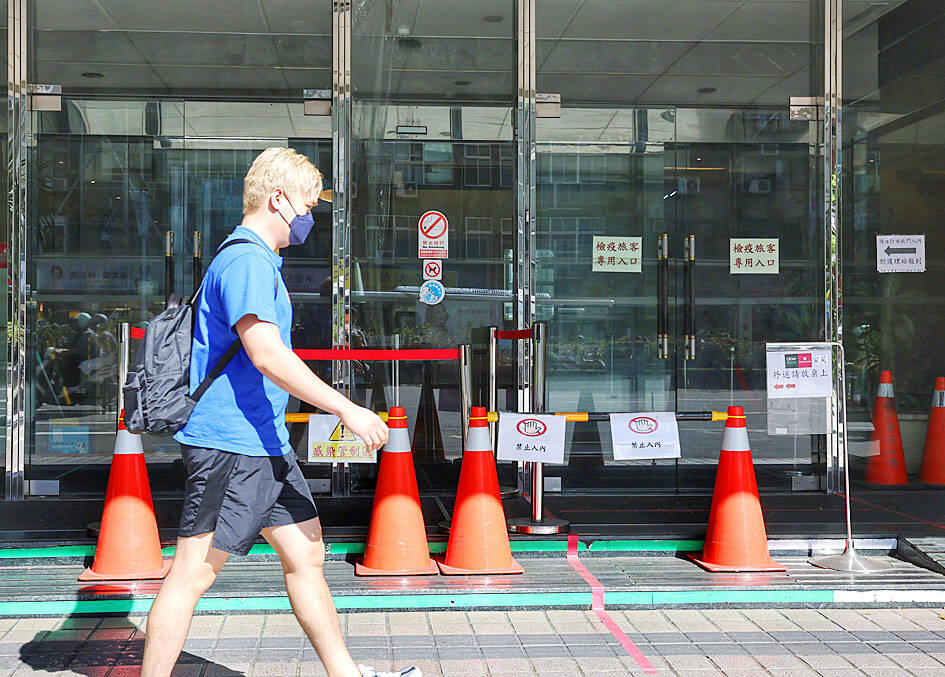The Tourism Bureau is studying the feasibility of offering subsidies to COVID-19 quarantine hotels as they transition back to normal operations after the government announced it would drop quarantine requirements for arrivals, Minister of Transportation and Communications Wang Kwo-tsai (王國材) said yesterday.
The nation still has about 382 quarantine hotels, Wang said.
“We thank all quarantine hotels for playing an important role in containing COVID-19 in Taiwan,” he said. “The Ministry of Transportation and Communications and the Ministry of Labor are working together to address the personnel shortage problem facing hoteliers. I also ask the Tourism Bureau to study the feasibility of subsidizing quarantine hotels as they transition back to being a normal hotel.”

Photo: CNA
The Central Epidemic Command Center (CECC) last week announced that international arrivals would no longer be required to quarantine after its new policy takes effect on Oct. 13, the bureau said in a statement on Monday night.
The new policy is the government’s response to the latest developments in the COVID-19 pandemic and the public’s hopes for life returning to normal, it added.
As such, hotels that were previously used for quarantine purposes should prepare to gradually shift back to normal operations, it said.
More than 860,000 people have stayed in quarantine hotels since the government implemented the quarantine policy for international arrivals, the bureau said, adding that the cumulative subsidies for quarantine hotels have exceeded NT$6 billion (US$188.8 million).
During the Lunar New Year holiday, hoteliers provided 32,000 rooms per day to meet travelers’ demand, with the average occupancy rate reaching a peak of 80 percent, the bureau said.
The number of quarantine hotel rooms has fallen to 24,000 per day due to changes in quarantine policy, with the average occupancy rate at about 60 percent, it said.
The Executive Yuan has asked the bureau to help hotels transition and prepare to host domestic and international travelers when the new quarantine policy is implemented, it said.
“We are working with the CECC to develop supporting measures for the new quarantine policy. We are also studying incentives and subsidies that could be provided to hoteliers, which would be announced once they are finalized,” the bureau said.

Alain Robert, known as the "French Spider-Man," praised Alex Honnold as exceptionally well-prepared after the US climber completed a free solo ascent of Taipei 101 yesterday. Robert said Honnold's ascent of the 508m-tall skyscraper in just more than one-and-a-half hours without using safety ropes or equipment was a remarkable achievement. "This is my life," he said in an interview conducted in French, adding that he liked the feeling of being "on the edge of danger." The 63-year-old Frenchman climbed Taipei 101 using ropes in December 2004, taking about four hours to reach the top. On a one-to-10 scale of difficulty, Robert said Taipei 101

Nipah virus infection is to be officially listed as a category 5 notifiable infectious disease in Taiwan in March, while clinical treatment guidelines are being formulated, the Centers for Disease Control (CDC) said yesterday. With Nipah infections being reported in other countries and considering its relatively high fatality rate, the centers on Jan. 16 announced that it would be listed as a notifiable infectious disease to bolster the nation’s systematic early warning system and increase public awareness, the CDC said. Bangladesh reported four fatal cases last year in separate districts, with three linked to raw date palm sap consumption, CDC Epidemic Intelligence

Taiwanese and US defense groups are collaborating to introduce deployable, semi-autonomous manufacturing systems for drones and components in a boost to the nation’s supply chain resilience. Taiwan’s G-Tech Optroelectronics Corp subsidiary GTOC and the US’ Aerkomm Inc on Friday announced an agreement with fellow US-based Firestorm Lab to adopt the latter’s xCell, a technology featuring 3D printers fitted in 6.1m container units. The systems enable aerial platforms and parts to be produced in high volumes from dispersed nodes capable of rapid redeployment, to minimize the risk of enemy strikes and to meet field requirements, they said. Firestorm chief technology officer Ian Muceus said

MORE FALL: An investigation into one of Xi’s key cronies, part of a broader ‘anti-corruption’ drive, indicates that he might have a deep distrust in the military, an expert said China’s latest military purge underscores systemic risks in its shift from collective leadership to sole rule under Chinese President Xi Jinping (習近平), and could disrupt its chain of command and military capabilities, a national security official said yesterday. If decisionmaking within the Chinese Communist Party has become “irrational” under one-man rule, the Taiwan Strait and the regional situation must be approached with extreme caution, given unforeseen risks, they added. The anonymous official made the remarks as China’s Central Military Commission Vice Chairman Zhang Youxia (張又俠) and Joint Staff Department Chief of Staff Liu Zhenli (劉振立) were reportedly being investigated for suspected “serious